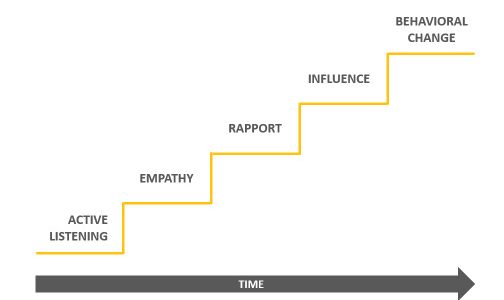A few weeks ago, Nobel-Prize-winner Daniel Kahneman passed away. We at Mobus Creative Negotiating have used a lot of his research findings. His prize was in economics, a subject in which he never took a college course. He was a psychologist whose great contribution was to show that people are not “rational actors” as long assumed by economists but instead… read more →
Sometimes we have to negotiate with people who stubbornly stick to obviously false propositions. Recent research suggests a way to influence some who seem impervious to facts. Conspiracy theorists have over the years proved remarkably hard to persuade (by the way, the percent of people who believe in conspiracy theories has not changed much in the last decade). Thomas Costello… read more →
We all shade the truth sometimes. As negotiators, we want to know if the other side is being forthright or telling us what we want to hear. In a new study – by Terri Kurtzberg at Rutgers University and Charles Naquin at DePaul University – 137 graduate students participated in a mock bargaining exercise where at stake was a pot… read more →
As Covid fades, you may well once again get invited to various networking functions with your suppliers and customers – meet-and-greet, social events, celebrations, and the like. These events can be important opportunities for you as a negotiator. This can be a chance to learn more about your counterparts – what are their plans, who is up and who is… read more →
We often want to know how we are doing as negotiators. Extensive research shows that most people are reluctant to give honest feedback. After mock negotiations run by two psychologists (David Yudkin at the Wharton School and Tessa West at NYU), those who did poorly asked “how did I do?” The result: “Most winners gave overly positive, noncritical feedback that… read more →
Artificial Intelligence (AI) has generated much interest, including much concern about which workers could be replaced by AI bots. The Wall Street Journal warns, “The stakes for people in sales, as in many fields, are clear: Keep doing your jobs better than a bot could do it – preferably a lot better – or risk replacement” (Callum Borchers, “In a Worker vs.… read more →
We at Mobus Creative Negotiating have long described how most American negotiators detest disagreement. They want to be liked by everyone including the other side in negotiations, and therefore they feel uncomfortable about anything which could cause conflict. Recognizing that being effective in business requires confronting this attitude head-on, the University of California at Berkeley’s Haas School of Business has… read more →
You develop a way to save 50 million lives. Of course, you become rich and famous, right? Well, not always – showing that sometimes our greatest successes in business do not bring the reward we deserve. In the Bangladesh of the early 1970s, Dr. Dilip Mahalanabis developed a simple technique to treat people with acute cholera who would otherwise die. … read more →
We at Mobus Creative Negotiating teach you how to face up to an inevitable part of negotiating that many of us find to be unpleasant – even intimidating. Most of us dislike disagreeing with others, which is part of what we must do as negotiators, no matter how politely and cheerfully we do it. We draw upon good advice from… read more →
At Mobus Creative Negotiating, creativity is our middle name. So it hurts us to acknowledge that nurturing creativity is hard to do. We do not just mean that it is hard to come up with creative ideas; we mean that there are deep barriers to implementing creative solutions. Much recent research has looked at “implicit bias,” exploring what people really… read more →
Recent research has brought out how much wisdom there is in Alexander Pope’s line, “a little learning is a dangerous thing.” We at Mobus Creative Research have often drawn on the work of psychologists. Here is another case. In their Harvard Business Review article “Research: Learning A Little About Something Makes Us Overconfident,” David Dunning and Carmen Sanchez explore how confident people… read more →
As negotiators, we often think about whether we want lower cost or higher quality. Well it is intriguing to realize that in the big picture, economic progress has come from having both at the same time. Jason Crawford writes in “The Roots of Progress” about the history of economic progress. Consider his account about the Industrial Revolution (Did the… read more →
Many people get anxious just thinking about business negotiations: the conflict, the pressure, the worry, the fear of failure all combine to make us not just nervous but distracted, uncomfortable physically and emotionally, and overwhelmed by feelings of helplessness. Wendy Suzuki, a professor of neural science and psychology at New York University, warns, “When we get stuck in that loop,… read more →
Toyota is at it again, and manufacturers globally are following suit. This creates opportunities for suppliers to get new customers. A few decades ago, companies around the world marvelled at Toyota’s “just in time” model for supply-chain efficiencies and economies of scale. By having suppliers deliver parts a few hours before they were used, manufacturers saved on warehouses and the… read more →
Juilia Galef, in her new book The Scout Mindset: Why Some People See Things Clearly and Others Don’t, describes Star Trek’s Mr. Spock as a “Straw Vulcan:” a caricature of rationality designed to make rationality look foolish. That’s because he thinks the way most economists did through the 1990s: they assume that everyone is rational all the time. Wrong! People are often… read more →
We at Mobus Creative Negotiating have made much use of the work of economics Nobel Prize winner Daniel Kahneman, a Princeton psychologist. Our recent blog drew from his new book, *Noise: A Flaw in Human Judgment*, written with Olivier Sibony and Cass Sunstein, to discuss how group-think can lead us astray. Now let’s look at what is the most surprising… read more →
We had an earlier blog about “persistence – or stubborness” drawing on the book Think Again: The Power of Knowing What You Don’t Know by Wharton School psychologist Adam Grant. Mobus Creative Negotiating prides itself on bringing to negotiators the latest insights of research, so here is another point made in that volume. Grant analyzes a classic study by Neil… read more →
We at Mobus Creative Negotiating have made much use of the work of economics Nobel Prize winner Daniel Kahneman, a Princeton psychologist. Together with Olivier Sibony and Cass Sunstein, he has a new book, Noise: A Flaw in Human Judgment. They define “noise” as “variability in judgments that should be identical,” and that they show that is a common feature of human… read more →



















Recent Comments